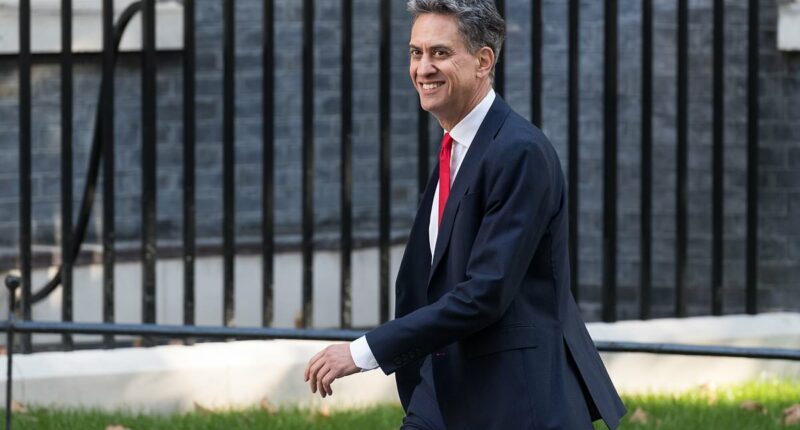Share this @internewscast.com
Will the last person to leave Britain please turn out the lights… That was a celebrated front page headline on April 9 1992, warning of the consequences should Neil Kinnock’s Labour win that day’s election.
But now, under Keir Starmer’s Labour government, the question might soon be: can we afford to turn on the lights, and even for those who can, will they work?
These are, or will be, the economic consequences of Ed Miliband and his messianic drive to make our entire national grid ‘fossil fuel free’ by 2030. During the election campaign he insisted that not only was this absolutely feasible, it would reduce average household energy bills by £300 a year.
Sinful
In reality, his own department this summer authorised a ‘maximum strike price’ for new offshore wind farms of £113 per megawatt hour, three times what the Climate Change Committee claimed would be the future cost – and compared to an average cost of electricity last year of £72 per megawatt hour.
Worse still, it is us, not the wind farm owners, who will also have to meet the additional costs of keeping our homes warm (and our industries humming) when the wind isn’t blowing – with what would amount to emergency supplies of gas.

Under this Labour government, the question might soon be: can we afford to turn on the lights, and even for those who can, will they work? Pictured: Energy Secretary Ed Miliband
But not with our own supplies, as Miliband wants to see an end to all that sinful hydrocarbon exploration, too – simultaneously destroying thousands of well-paid jobs in the British sector of the North Sea.
As one in that industry told me: ‘There are a hundred times the number of jobs in the North Sea at risk than what the government is preserving by keeping open the Scunthorpe steel plant. And the problems of our steel industry are anyway the result of Britain’s crazy energy policy, with the highest prices in the developed world.’
Miliband constantly insists we should be proud of ‘leading the world on climate change policy’. But instead of being an example to other nations, we will be a warning.
Fascinatingly, one of those who has made this point is the American economist Noah Smith. It’s fascinating because Smith is, in his own country, a passionate supporter of renewable energy, and an eloquent critic of Donald Trump’s hostility to wind and solar power. Yet on his Substack platform last week, Smith wrote: ‘To see how a mismanaged and misguided push for green energy can hurt a country’s economy, you have to look no further than the UK…
‘The UK was one of those small special cases where it really did make sense to keep using fossil fuels. The UK is a relatively small nation, so this wouldn’t have made much of a difference to climate change. Now, expensive energy is causing a political backlash in the UK. And why shouldn’t it? The UK chose to deprive its citizens and companies in order to produce a totally performative emissions reduction, setting an example that almost no other countries followed.’
Yes, it’s performative, because we have simply offshored our emissions: for example by taking colossal quantities of ‘renewable’ wood from North America to burn in the mighty Drax power station, rather than British coal it used to burn.
As for no other countries following, it’s more than that: countries or leaders who previously took a similar line, have smartly reversed.
New Zealand, which under Jacinda Ardern in 2018, instituted a ban on drilling in the country’s substantial subsea gas reservoirs, has re-started exploration. The new government’s resources minister, Shane Jones, had taken note of the New Zealand national grid bosses warning that the country was at risk of blackouts because renewables had not been generating sufficient power during cold snaps. Believe it or not, we have cold snaps too, frequently on the stillest of days.
Most strikingly, Mark Carney who, as Governor of our own Bank of England made ‘fighting climate change’ part of the Bank’s remit and then set up something called the Net-Zero Banking Alliance, has – upon becoming Canada’s prime minister –scrapped the hated carbon tax he once eulogised. And he declared that Canada should boost conventional as well as ‘clean’ energy: ‘Yes, that does mean oil and gas. It means using our oil and gas here in Canada, to displace imports wherever possible.’
Unsurprisingly, Carney’s Net-Zero Banking Alliance has disintegrated. And a few days ago, Lloyd’s of London, our great insurance market, followed suit on its carbon-reducing ambitions. The new chief executive, Patrick Tiernan, scrapped his predecessor’s pledge to make the market ‘net zero’ by 2050, and said insurers who operate at Lloyd’s will no longer have to hit targets requiring them gradually to stop underwriting fossil fuel projects.

This year BP’s new chief, Murray Auchincloss, bluntly announced: ‘We have completely decapitalised renewables’
Disaster
Commercially, it would have been suicidal for Lloyd’s to continue with its Milibandism. A fact underlined by BP, which under its previous boss, Bernard Looney, had decided its traditional business was incompatible with its ‘environmental, social and governmental’ objectives, and went full pelt into renewable energy. It was a disaster, its share price plummeting relative to its rivals. This year its new chief, Murray Auchincloss, bluntly announced: ‘We have completely decapitalised renewables.’
And look what happened last week at BP’s arch-rival, Shell. It ditched the construction of a colossal bio-fuel plant in Rotterdam, as part of its own retreat from ‘green’ energy. This had been designed to make so-called sustainable aviation fuel out of crops more suitable for making into food. But, as Shell’s boss, Wael Sawan, pointed out, not only was this still up to four times more expensive than kerosene, there had been ‘backsliding on [biofuel] mandates in multiple countries’.
This makes a mockery of Rachel Reeves’ claim in January, when giving the go-ahead to Heathrow expansion, that it would all be compatible with comrade Miliband’s policies, because sustainable aviation fuel would be a ‘game-changer’.
Meanwhile, Sir Jim Ratcliffe on Monday announced that his Ineos Energy company had ‘stopped investing in Britain’ because ‘the problem is that the UK has become one of the most unstable fiscal regimes in the world from a perspective of natural resources and energy’.
Extinction

Sir Jim Ratcliffe on Monday announced that his Ineos Energy company had ‘stopped investing in Britain’ because ‘the problem is that the UK has become one of the most unstable fiscal regimes in the world from a perspective of natural resources and energy’
I’ve got little sympathy for Ratcliffe, given he declared his backing for Labour during last year’s General Election campaign. What else did he imagine Ed Miliband would do, as the man committed to the extinction of exactly the sort of businesses Ratcliffe owns (petrochemicals)?
It seems Keir Starmer is belatedly queasy about Miliband’s agenda: the PM tried to persuade him to take charge of the department previously run by the defenestrated Angela Rayner. But Miliband refused to move.
The problem for Starmer is that Miliband is the most popular cabinet minister among Labour Party members, with a rating of +74 per cent. So he could stare down his own leader, a man vastly less admired within the party. Or as ‘a senior TUC figure’ told the Independent: ‘Ed is the last Left-wing person left in the Cabinet, so he has our support.’
The trouble is, Miliband is also ensuring that the UK has the last government in the world to see what way the wind is blowing on energy production. The West’s rush to net zero, as some of us have long predicted, is being abandoned because the claims it would benefit the consumer have been exposed as fantasy.








